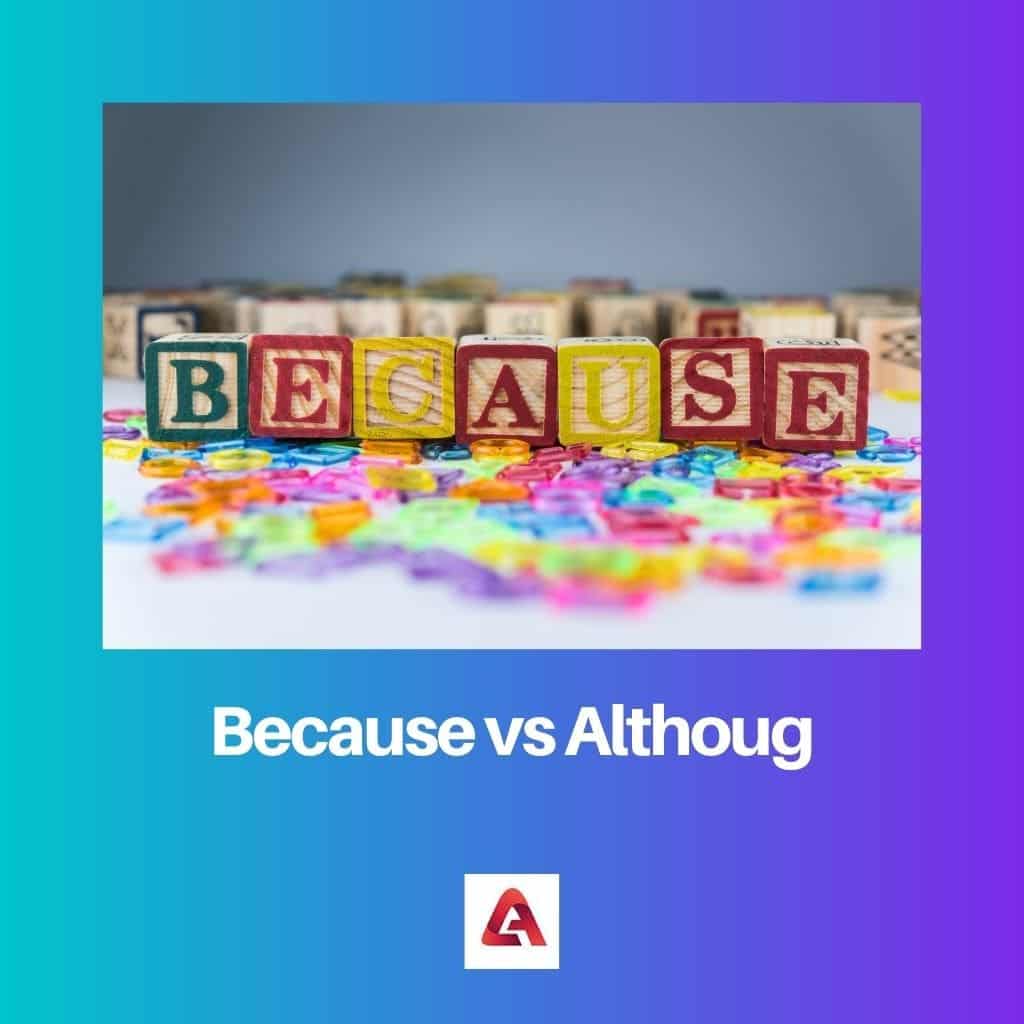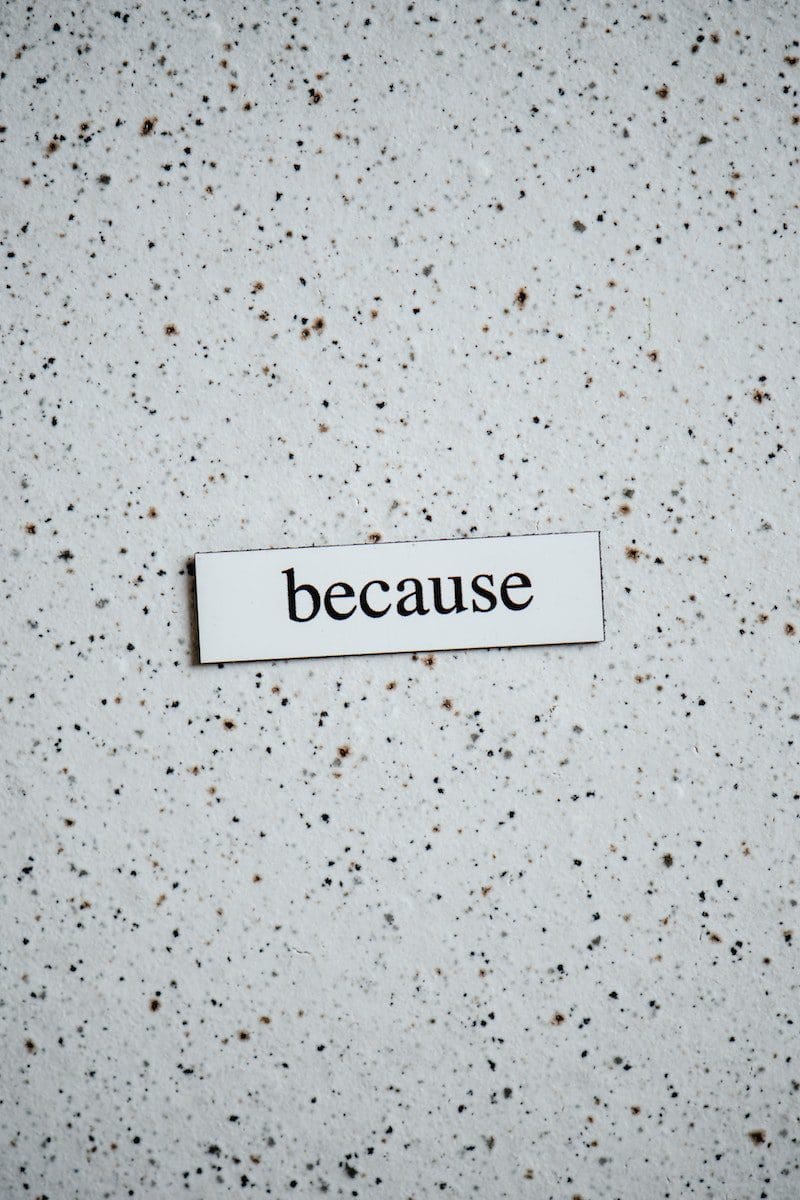“Because” introduces a causal relationship, indicating the reason behind an action or phenomenon. It establishes a clear link between cause and effect, providing logical justification for a statement or event. “Although,” on the other hand, presents a contrasting condition or idea against an expected or stated condition. It acknowledges a potential contradiction or obstacle, emphasizing the existence of opposing factors but still allows for the assertion of the main point.
Key Takeaways
- “Because” is a conjunction used to introduce the reason or cause of an action or event; “although” is a conjunction used to introduce a contrast or a conflicting idea, showing that something is true despite an opposing factor.
- “Because” shows causation, while “although” shows concession or contrast between two statements.
- “because” and “although” are conjunctions used to connect clauses, but they serve different purposes in expressing relationships between ideas.
Because vs. Although
“Because” is a conjunction that is used to show a cause-and-effect relationship between two clauses or ideas. “Although” is a conjunction that is used to show a contrast or a concession between two clauses or ideas and is used to express a contradiction or an unexpected situation.

- “Because” is a subordinating conjunction that gives the cause of something. It is also used as a compound preposition.
- “Although” is a subordinating conjunction that means – despite something. It is also used as a prepositional phrase.
Comparison Table
| Feature | Because | Although |
|---|---|---|
| Function | Connects clauses to show a causal relationship between them. | Connects clauses to highlight a contrast between them, often introducing a concession. |
| Cause and Effect | Establishes the first clause as the reason for the second clause. | Acknowledges the first clause, but emphasizes the second clause despite the first clause. |
| Sentence Position | Can be placed at the beginning, middle, or end of the sentence, depending on the emphasis desired. | Usually placed at the beginning of the sentence or after the first clause it introduces. |
| Emphasis | Emphasizes the cause-and-effect relationship between the clauses. | Emphasizes the concession and highlights the second clause despite the first clause. |
| Examples | * He arrived late because of the traffic jam. * I studied hard, because I wanted to get a good grade. * She went for a walk because the weather was nice. | * Although it was raining, we decided to go for a picnic. * She is kind, although she can be shy at times. * I enjoyed the movie, although the ending was disappointing. |
When to Use the Word Because?
Definition:
“Because” is a conjunction used to introduce a reason or cause for an action, event, or situation. It establishes a causal relationship between two parts of a sentence, indicating why something happened or is happening.
Key Points:
- Cause and Effect: “Because” is primarily used to connect the cause to its effect, providing a logical explanation for an event or action. For example: “She couldn’t attend the meeting because she was sick.” Here, the reason for her absence (being sick) is connected to the effect (not attending the meeting).
- Clarification: “Because” helps to clarify the relationship between different parts of a sentence, making the connection between the cause and the effect explicit. It answers the question “why” something happened or is happening.
- Structure: In terms of sentence structure, “because” typically comes before the cause or reason, followed by the effect. For example: “He missed the bus because he overslept.”
- Informal Usage: While “because” is commonly used in both formal and informal contexts, it is often more prevalent in casual or spoken language. In formal writing, alternatives such as “since,” “as,” or “due to the fact that” may be preferred for greater formality.
Examples:
- Informal: “I didn’t go to the party because I had to study for my exams.”
- Formal: “She couldn’t complete the project on time because of unforeseen complications in the supply chain.”

When to Use the Word Although?
Definition:
“Although” is a conjunction used to introduce a contrasting or unexpected clause in a sentence. It indicates a concession or acknowledgment of opposing information or conditions, often leading to a statement that may seem contradictory.
Key Points:
- Contrast: “Although” is primarily used to express a contradiction or opposition between two clauses or ideas. It introduces a clause that presents information contrary to what might be expected based on the main clause.
- Acknowledgment of Obstacles or Contradictions: By using “although,” speakers or writers acknowledge the existence of obstacles, challenges, or contradictory factors that may affect the main point being made.
- Complexity and Nuance: “Although” adds depth and nuance to a sentence by acknowledging conflicting information or conditions. It allows for a more nuanced understanding of a situation by presenting both sides of an argument or scenario.
- Structure: Typically, “although” precedes the clause containing the contradictory or contrasting information. The main clause, which presents the primary idea or assertion, follows “although.” For example: “Although it was raining, we decided to go for a walk.”
Examples:
- Contrast: “Although she was tired, she continued working on her project.”
- Acknowledgment of Obstacles: “Although the experiment yielded interesting results, the sample size was too small to draw definitive conclusions.”
- Complexity and Nuance: “Although the company faced financial difficulties, its innovative approach to marketing helped it stay afloat.”
Main Differences Between Because and Although
- Cause vs. Contrast:
- Because: Introduces a reason or cause for an action or situation, establishing a causal relationship.
- Although: Introduces a contrasting condition or idea, acknowledging opposition to the main assertion.
- Explanation vs. Concession:
- Because: Provides an explanation by clarifying the reason behind an event or action.
- Although: Concedes or acknowledges opposing information, adding complexity to the main point.
- Forward vs. Backward Linkage:
- Because: Links the cause (preceding clause) to its effect (following clause) in a forward manner.
- Although: Presents the contrasting condition or idea (preceding clause) before the main assertion (following clause), establishing a backward linkage.
- Causal Relationship vs. Contradiction:
- Because: Emphasizes cause and effect, highlighting the logical connection between events or actions.
- Although: Emphasizes contradiction or opposition, acknowledging conflicting information or conditions.
- https://en.m.wikipedia.org/wiki/Part_of_speech
- https://www.macmillandictionary.com/amp/dictionary/british/because

The article’s elucidation on ‘because’ and ‘although’ is succinct and well-crafted.
The explanations provided in the article are rigorous and offer clarity.
A well-structured look at the comparison between ‘because’ and ‘although’, very informative.
I found the explanations provided to be slightly complex and not as accessible as they could be.
I can understand why you feel this way, but the complexity allows for an in-depth comprehension of the topic.
The author’s expertise on the subject shines through in this comprehensive article.
The article is enlightening and offers a comprehensive understanding of the subject matter.
This article makes learning about conjunctions an enjoyable experience, the language and explanations are engaging.
I wholeheartedly agree, the content here is digestible and enjoyable to engage with.
The exemplification of the usage of ‘because’ and ‘although’ is enlightening and elucidating.
The author exudes intelligence and this article proves to be an enriching read.
I couldn’t agree more. This article does justice to the complexity of these conjunctions.
Absolutely, the careful analysis and breakdown of the usage of ‘because’ and ‘although’ is commendable.
This article is thorough and insightful, it provides a clear understanding of the differences between ‘because’ and ‘although’.
I agree, the examples provided and the comparisons drawn are very helpful in understanding the usage of these conjunctions.